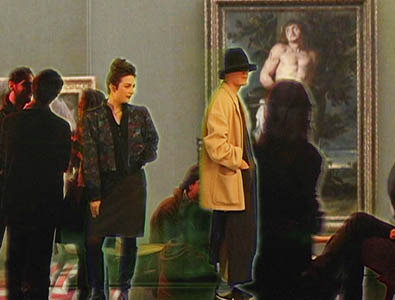Ken Okiishi
dal 15/7/2013 al 31/8/2013
Segnalato da
15/7/2013
Ken Okiishi
MIT List Visual Arts Center, Cambridge
List Projects. The artist presents 3 filmic works. Okiishi uses video as a means to explore circuits of communication, memory, and agency in and between networked cities through moments when language falls apart.

Ken Okiishi uses video as a means to explore circuits of communication, memory, and agency in and between networked cities through moments when language falls apart, meaning is dislocated, and analogies are incomplete or false. He draws on the linguistic and musical structure of existing movie scripts and scores as a point of departure, using friends and local constituents as actors to reveal ways in which communication and personal and cultural memory are shot through with dissonances and repressions. With considerable humor, Okiishi’s work intervenes in how subjects are produced by totalizing concepts such as international real estate, the art world, or the dream of perfect translation—and the fractured analogies they foster between locations and cultures—to create a potential space of individual and collective agency that also points to the limits of that desire for agency
The List Center will present three of Okiishi's works. Filmed in New York and Berlin, Okiishi’s (Goodbye to) Manhattan (2010, 73 min.) consists of re-imagined scenes from Woody Allen’s iconic movie, using as the script the Google translation of the original film’s official German translation. parapluies/paraplyer/’nobody can tell the why of it’/1857/oslo/2011 (2011, 9 min.) overlays musicians—including members of existing Norwegian metal, klezmer-inspired, and indie bands, and a boy soprano—interpreting a song from Jacques Demy’s The Umbrellas of Cherbourg. The Deleted Scene (2012, 28 min.) takes as its starting point the opening scene of the Hollywood musical Gold Diggers of 1933 and AP News, a self-organized, artists’ run cinema space in Zurich.
About the Artist
Ken Okiishi (b. 1978) is an artist who has been living and working between Berlin and New York since receiving a BFA from The Cooper Union for the Advancement of Science and Art in 2001. Recent solo exhibitions include The Very Quick of the Word (curated by Annie Godfrey Larmon), Hessel Museum of Art, Bard Center for Curatorial Studies, Annandale-on-Hudson, New York, (2013); (Goodbye to), Take Ninagawa, Tokyo, (2012); Gino / Marcel Duchamp on Streeteasy.com, Mathew, Berlin (2012); (Goodbye to) Manhattan, Mehringdamm 72, Berlin, (2010); and (Goodbye to) Manhatttan, Alex Zachary, New York, (2010). He recently participated in a symposium on poetics and conceptual art at Triple Canopy, New York, where he discussed, in dialogue with poet Aaron Kunin, translation processes coming out of his work with the older Google translation algorithms used in making (Goodbye to) Manhattan; an annotated transcript of this public dialogue is published in the book Corrected Slogans: Reading and Writing Conceptualism (Triple Canopy, 2013). His writing on art has appeared in publications including Artforum, May, and Bidoun. Okiishi has shown work widely in group shows, including recent exhibitions at institutions including Artists Space, New York; Kunsthaus Bregenz; Kunstalle Bern; Arnolfini, Bristol; GAMeC, Bergamo; 1857, Oslo; Peep-hole, Milan; ICA Philadelphia; Camden Arts Centre, London; and White Columns, New York.
List Projects: Ken Okiishi is curated by List Center Assistant Curator Alise Upitis.
About List Projects
As an ongoing program of exhibitions and presentations, List Projects supports the work of younger artists at pivotal points in their career, as well as those artists otherwise lacking an institutional voice. This new exhibition initiative augments the List Center’s exhibition program, allowing both the institution to continue its support of emerging and underrepresented artists, and its galleries to remain on view throughout the year.
Image: (Goodbye to) Manhattan, 2010. Courtesy the artist
Press contact:
Mark Linga Tel 617 4523586 mlinga@mit.edu
MIT List Visual Arts Center
20 Ames Street, E15-109 Cambridge, MA 02139
Hours: Tues-Wed 12-6pm; Thurs 12-8pm; Fri-Sun 12-6pm; Closed Monday



